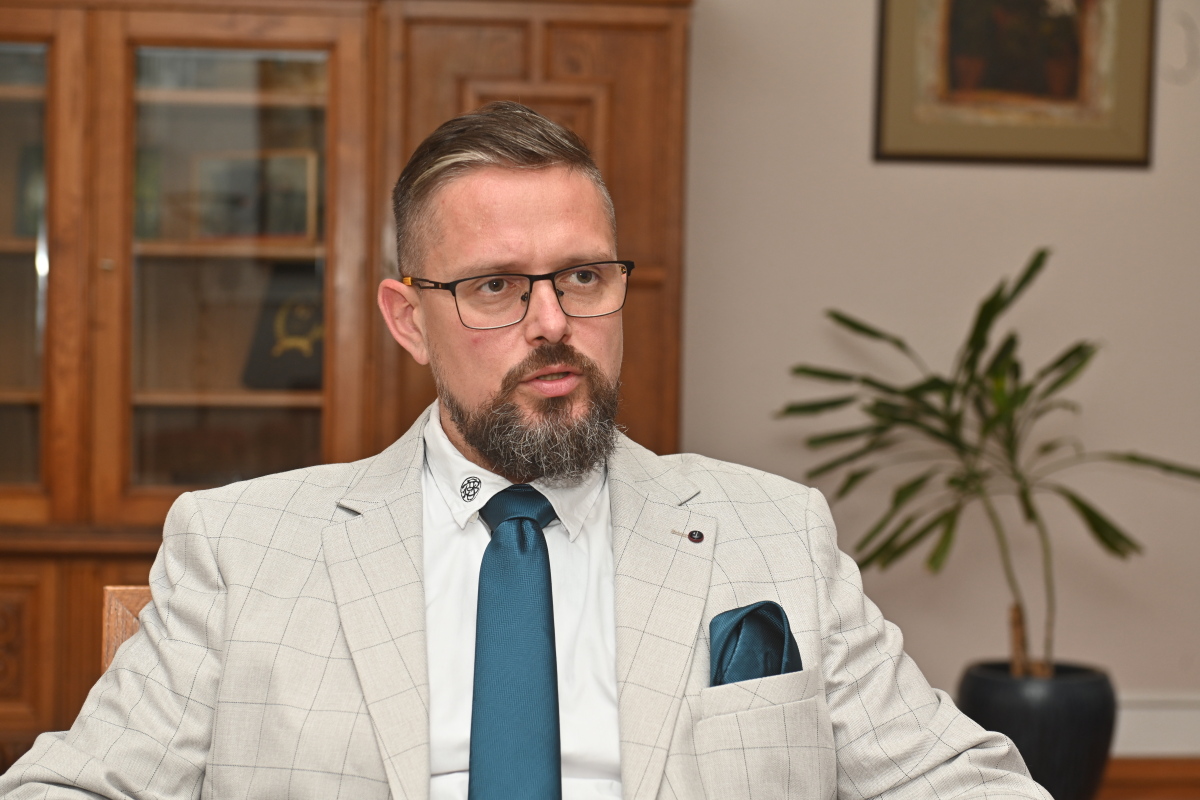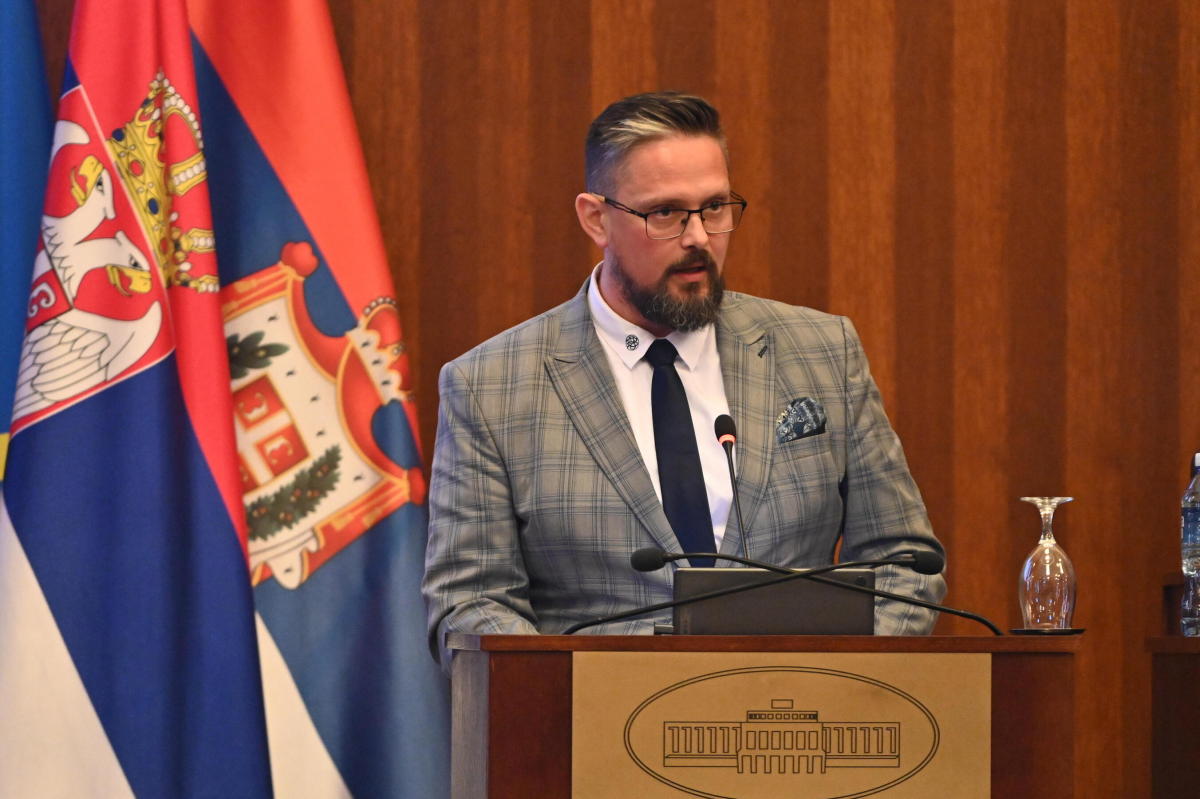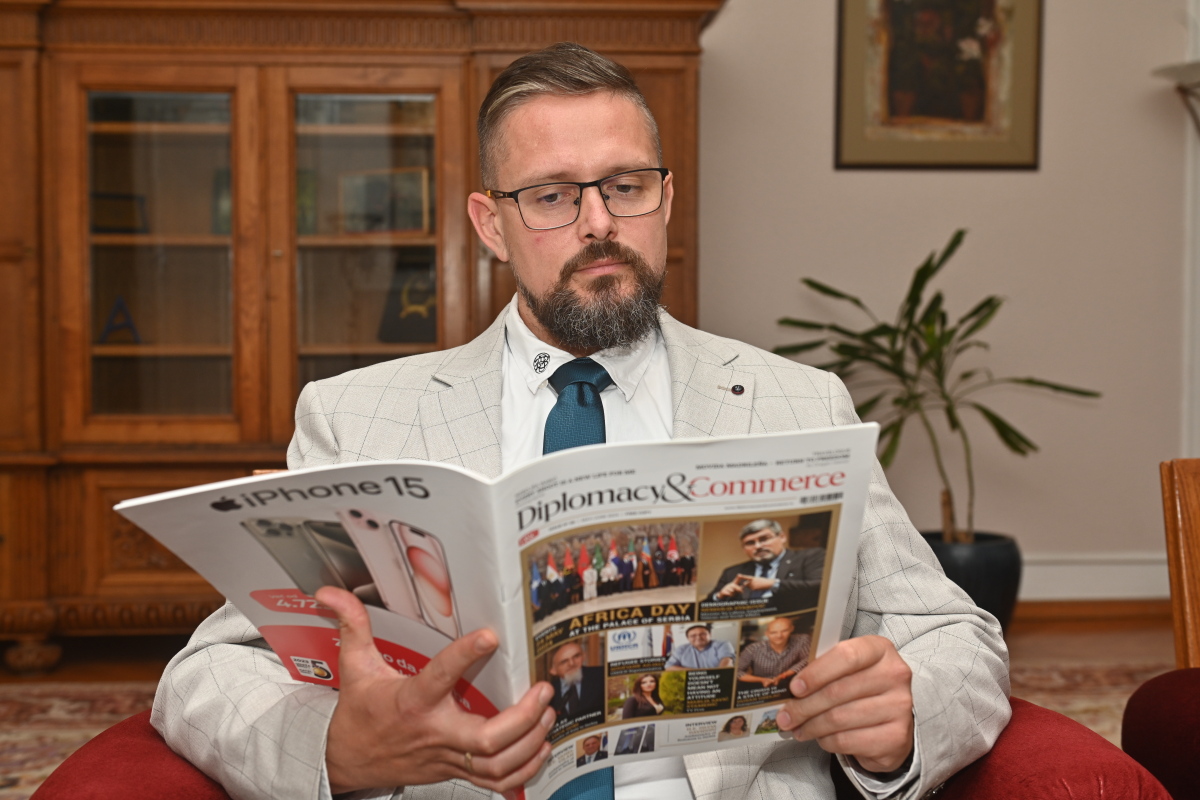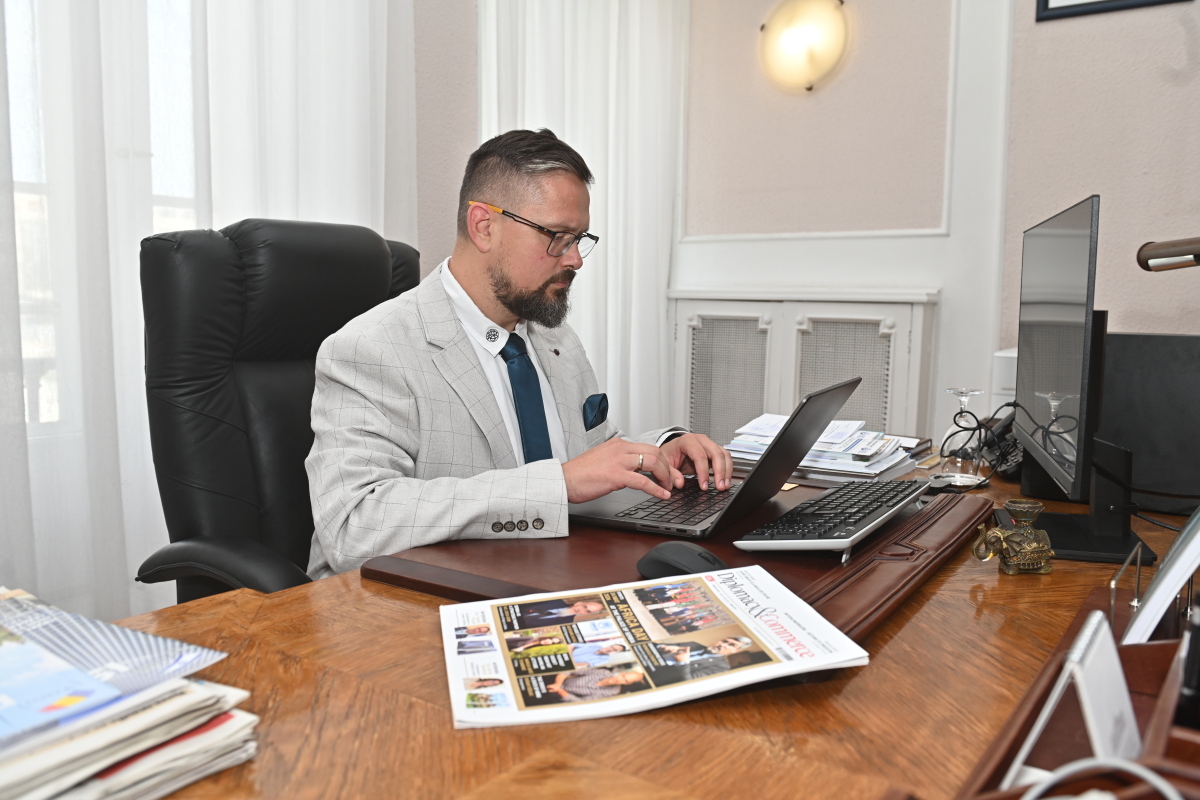The policies of multiculturalism, a country opts for, are vital for the preservation of multiculturalism, and ethnic, linguistic, cultural, and religious diversity
Interview with Bálint Juhász, President of the AP Vojvodina Assembly, by Robert Čoban
_______________________

In front of Balint Juhas’ office in the Assembly of Vojvodina, there are flags of 11 national communities living in the Province. Since 2008, through coalition agreements first with the Democratic Party, the League of Social Democrats of Vojvodina, and the SPS, and since 2016 with the SNS and SPS, the left building of the Brašovan complex in Banovina “belongs” to the majority ruling party, which appoints the President of the Provincial Government. From 2004 to 2016, this was Bojan Pajtić from the DS, from 2016 to 2024, Igor Mirović from the SNS, and since May 2024, Maja Gojković, also from the SNS. On the right, a smaller part of the Banovina complex is the Assembly of Vojvodina, which since 2008, according to coalition agreements, belongs to the Alliance of Vojvodina Hungarians. Its leader from 2008 to 2012 was Šandor Egereši, and from 2012 until he died in 2023, the leader of that party, István Pásztor. After Pásztor died in 2023, the position was temporarily held for several months by the oldest MP, Momo Čolaković (born in 1940) from the Party of United Pensioners of Serbia, until after the elections in December 2023, Balint Juhas, also from the Alliance of Vojvodina Hungarians, took the seat.
Balint Juhas welcomes me to the seating area where I previously held meetings with István Pásztor. He seems aware of the “big shoes” of his predecessor that he has stepped into and says he will continue all the good things István Pásztor started. We find common ground when it comes to cycling; both of us are pleased about the upcoming opening of the high-speed rail line between Novi Sad and Subotica, which will provide additional economic impetus to that part of Vojvodina and make it easier to visit towns like Mali Iđoš or Bačka Topola, which are on the route but have not often been on tourist maps.
In the position of President of the AP Vojvodina Assembly, you have succeeded István Pásztor, who is considered the architect of good relations between the Alliance of Vojvodina Hungarians (SVM) and the Serbian Progressive Party (SNS), but also of personal relations between President Aleksandar Vučić and Prime Minister Viktor Orbán, which led to the historically best relations between the two countries. From this position, what is your view on the relations between Serbia and Hungary, but also between Serbs and Hungarians in Vojvodina?
I look at the relations between the Republic of Serbia and Hungary through the prism of the responsibility of politics and politicians for making strategic decisions that have a long-term effect on the change in economic, political, and cultural relations between the two countries and two peoples. There are rare historical moments when politicians get the chance to make such decisions. It was one of these historical moments that István Pásztor recognised, thanks to which the processes of historical reconciliation between the two nations were initiated, which represented the foundation for further improvement of relations in all spheres.
Hungarians and Serbs have lived together for a thousand years, with each other and next to each other
Serbia and Hungary have shown great political strength, the awareness that only accepting the truth about the common past can create a real foundation for the future. Hungarians and Serbs have lived together for a thousand years, with each other and next to each other. Over the centuries there have also been political alliances, historical conflicts, royal marriages, and great literary and personal friendships such as that of Ferenc Fehér and Miroslav Antić, the Matica Srpska was established in Budapest in 1826… In all the turning-point years for European history, such as 1456, 1697, as well as 1848, 1918, 1945, and 1956, regardless of whether we were on the same or opposite sides, we shared and still share a common history.
Today, we are discussing the historically best relations between the two countries for a reason. For example, Serbia has signed agreements on strategic partnerships with only eight countries in the world, and only with Hungary has it formed a Strategic Cooperation Council. It is up to our generation to continue walking in our predecessors’ footsteps and raise the bar of partnership. In this sense, by the competencies of the President of the APV Assembly, I will try to provide an institutional and personal contribution to the further strengthening of the ties between our two peoples.
In front of your office are 11 flags of the people living in Vojvodina. How is it possible to preserve the multiculturalism of Vojvodina under the circumstances of assimilation, and emigration of citizens who have EU passports and are mostly persons belonging to minority nations (Hungarians, Croats, Slovaks, Romanians..)?
To put it in one sentence: perspective, prosperity, and respect for the dignity of the citizens of Vojvodina, both of the persons belonging to the majority and all minority communities equally. Persons belonging to all 26 national communities living together in Vojvodina build their future in communities where we strive to provide the prerequisites for a decent and dignified life. Migrations are a part of life, it has always been like that, finally, Vojvodina was created as a European project of planned settlement in the 18th century – partly using carriages, partly by the Danube, using wooden ships, so-called “Ulm boxes” with which today’s natives used to come.

It is indisputable that migration is an important political, economic, demographic, and cultural phenomenon, which affects the daily life of both the majority and minority communities. Migration flows in Serbia do not differ from the trends in most of Europe, especially in its central and eastern parts, where we witnessed mass migrations especially in the first years after the accession of these countries to the EU. Today, both persons belonging to the majority and minority communities leave in search of a perspective. At first glance, the impression is that most of those leaving are those who possess the citizenship of one of the EU member states, although since the labour market, for instance in Germany, has been opened to citizens of third countries, citizenship or passport is no longer a decisive factor. It is a legitimate matter of individual decisions and it is up to us to create such circumstances, that it is possible to have the standards of a good and decent life here.
Assimilation processes are natural, and there are numerous reasons, but it is important, with a secured future, to preserve the identity of the persons belonging to every, even the smallest, minority community, even when it seems that this is impossible. Regarding the preservation of the identity of persons belonging to minority communities, Serbia decided to promote minority self-government embodied by national councils of national minorities that play a key role in the fields of education, culture, information, official use of language, and script. The work of the national councils is supported by significant funds from the budget, from municipal, through provincial to national levels. Funds are allocated from the APV Budget to support media in minority languages, and educational and cultural programs that preserve the traditions of minority communities and multicultural Vojvodina.
If I may dispense with false modesty and add that I believe that, in addition to the abovementioned, the eight-year activities of the “Prosperitati” Foundation have in part contributed to the families staying in their homeland. The successful operation of this Foundation is the result of the efforts made by the political party the Alliance of Vojvodina Hungarians, of which I am a proud member, in creating a strategy and work programme. You were the manager of the Prosperitati Foundation. To what extent do its operations impact Hungarians to stay, live, and create in their hometowns and villages in Vojvodina? Can you give us some statistical data?
To be frank, it is not usual for a minority party to deal with issues of economic development, but in constant contact with people on the field, this topic was imposed as an inevitability. István Pásztor understood that the question of the survival and future of persons belonging to the minority national community is complex, that it implies not only advocacy for the protection, preservation, and improvement of the body of minority and human rights but also the creation of economic prospects for families and communities. To that end, an economic development strategy and an action plan were drawn up on his initiative, supported by the Government of Hungary, and implemented by the “Prosperitati” Foundation. Since 2016, 16,500 projects have been supported through the economic development program and more than 530 million euros have been invested in the development of Vojvodina, of which 255 million euros have been provided from the Hungarian budget; 1,300 houses in the countryside were bought for young married couples, single mothers, about 3,000 micro-family businesses and almost 6,000 agricultural households with more than 12,500 workers were financed, more than 4,500 new jobs were opened and nearly 7,000 new businesses were started. Residents of 181 settlements from 39 out of a total of 45 Vojvodina local self-governments participated in the program and the implemented projects contributed to improving the position of at least 50,000 Vojvodina Hungarians.
Since 2016, 16,500 projects have been supported through the economic development program and more than 530 million euros have been invested in the development of Vojvodina
It is important that at the moment of launching the “Prosperity” Foundation, President Aleksandar Vučić recognised its importance and gave full support to this program because the entire country enjoys the benefits and that is still the case today. New jobs are being opened, taxes are being paid to the state, and new value is being created. We do not claim that the above results mean a long-term solution to all economic problems, because it is not realistic for one minority party or foundation to solve them all. Our goal is rational, to provide some kind of a lure to those who intend to stay and progress in Vojvodina. It often happened that the measures of our program had a decisive influence on families staying and building a future in their homeland.
In the play titled “Once upon a Time in Novi Sad” by András Urbán in the Újvidéki Színház, the actress at one point makes an announcement in the language of the second most populous nation in Novi Sad and everyone expects it to be Hungarian, but she starts reading in Russian instead, because, over the past two years, Russians have come out on the second place in the city. Are you satisfied with the cooperation with state authorities when it comes to education? How many primary and secondary schools in Novi Sad hold classes in Hungarian?
The policies of multiculturalism, a country opts for, are vital for the preservation of multiculturalism, and ethnic, linguistic, cultural, and religious diversity. The Novi Sad Theatre – Újvidéki Színház marked its first 50 years of work with a play “Once upon a time in Novi Sad”. This theatre is the only cultural institution in Novi Sad that bears the name of the city, and for which, as an institution of special importance for the National Council of the Hungarian National Minority, stable funding has been provided from the city budget, namely 142 million dinars for the year 2024. Since last year, the Hungarian Cultural Centre “Petőfi Sándor”, this time as a city’s cultural institution, has continued its work in a restored building in Telep, which is an indicator of how well the Hungarian community is established in Novi Sad’s cultural life and the city’s institutional structure.

It is not unusual that, in the complex geopolitical situation, families from Russia and Ukraine in Serbia, Vojvodina, and especially in Novi Sad, see a safe place for their families and professional prospects. A century ago, in the circumstances of war and revolution, an intellectually strong community of artists, professors, architects, and engineers from Russia came to Serbia and forever left their mark on science, education, and culture. For more than a century, Novi Sad has proudly cherished the memory of the story that the famous Leo Nikolayevich Tolstoy planned to spend his old age exactly at the Novi Sad address, at 35 Šafarikova Street. A note by Triva Militar, a well-known cultural worker, about “Preparations to welcome Leo Tolstoy in Novi Sad” is kept in Matica Srpska. Unfortunately, the great writer died before he became a citizen of Novi Sad.
We are committed to improving the quality of education in the Hungarian language at all levels, from pre-school to university. The Ministry has introduced a good practice to approve classes of five pupils/students as sufficient, respecting the principle of positive discrimination and applying affirmative measures. In recent years, all primary school classes with a smaller number of students have received approval from the Ministry, and the interests of our community have also been taken into account in cases of approval of secondary school classes. The hiring of teachers as well as the engagement of external experts, and members of the Hungarian national community, have also been approved.
We are working intensively to complete the commenced process of partial transfer of founding rights of primary and secondary education institutions that are of particular importance for education in the Hungarian language to the National Council of the Hungarian National Minority.
In the territory of the city of Novi Sad, teaching in the Hungarian language takes place in four primary schools: “Sonja Marinković”, “Attila József”, “Petőfi Sándor” and “Ivo Andrić” in Budisava, as well as in five secondary schools: Secondary School of Medicine “7. April”, Grammar School “Svetozar Marković”, Agricultural School with student dormitory “Futog”, School of Design “Bogdan Šuput” and Electrical Engineering School “Mihajlo Pupin”.
In your opinion, what are the opportunities for the economy of Vojvodina? In what direction should it develop? Traditional agriculture, tourism, or new technologies Novi Sad has already become recognisable for?
Since 1,499,521 ha of agricultural land is cultivated in Vojvodina, out of a total of 3,947,257 ha of available agricultural land in Serbia, it is logical that agriculture is the most important economic sector. We are living in a time of great changes, the consequences of which cannot be avoided and will be felt not only by us but also by generations of our children. Therefore, it is important to choose the direction of economic and social development that will connect science, politics, and economy, as well as doing business in an economically profitable, ecologically acceptable, and socially just way of management.
There is no doubt that new technologies must serve economic development and preservation of life and health of people and that agriculture requires the introduction of scientific achievements suitable for the 21st century. For instance, six years ago, the first digital farm in Serbia and the region was opened in Krivaja, near Bačka Topola, which was designed by the “BioSense” Institute in cooperation with the agricultural producer “Krivaja”, within the ANTARES project.
We are committed to improving the quality of education in the Hungarian language at all levels, from pre-school to university
Novi Sad has grown into one of the largest and most important regional IT centers. In our scientific and research centers, the latest trends that shape the future of artificial intelligence are also explored. The IT sector is experiencing dynamic growth and should continue in that direction. Tourism is also constantly growing; there is an increasing number of domestic and foreign tourists. We have high-quality accommodation capacities, the tourist infrastructure and the conditions for active vacations are improving, and bicycle paths are being built. At the same time, gastronomy and natural beauty are at an enviable level. On the other hand, various platforms, such as the platform Hello Vojvodina! which we brought to life thanks to the Prosperitati Foundation and experts in this field such as Dankó Dénes, who has recently received the Chamber of Commerce of Vojvodina award, promote Vojvodina’s heritage as part of European and regional culture and tradition and improve the tourist offer. It is important for us that the economic and tourism development of Vojvodina is accompanied by appropriate protection of the historical and cultural heritage, to preserve the authentic architectural heritage of Vojvodina’s cities and smaller settlements.
We have started our conversation by noting that the relations between Serbia and Hungary reached the historical maximum, which was also demonstrated through the strategic interstate project of the construction of the Belgrade-Budapest high-speed railway, which will be a strong impetus for the economic development of both countries. The construction of roads and supporting infrastructure is an important component of profound social change, and therefore we continue working on the construction of industrial zones, reconstruction, and construction of border crossings, river docks, regional roads, and railways.
The weakening of “pro-autonomy” parties, such as the League of Social Democrats of Vojvodina (LSV), in the past 10 years has completely pushed discussions on the topic of Vojvodina’s autonomy into the background. This year is the 50th anniversary of the famous 1974 Constitution, which has been controversial for many in Serbia due to the “excessive rights” given to the provinces. From your standpoint, what is the right measure of Vojvodina’s autonomy that would suit all its citizens?
The constitutional legal order regulated by the 1974 Constitution brought significant changes at all levels: on the one hand, for the federal state, because the concept of the federation was already changed by constitutional amendments, and on the other, the issue of the sovereignty of the Republic of Serbia opened, as well as the issue of the capacity of Vojvodina itself to assume and bear part of the power, that is, authority and responsibility in the management of public affairs and policies.
Disputes about the autonomy of Vojvodina are still present today, and there is no agreement on the answer to the question of whether decentralization of the state and society guarantees essential political democratization, not even half a century after the promulgation of the 1974 Constitution.
Novi Sad has grown into one of the largest and most important regional IT centers
However, there is no dilemma for the Alliance of Vojvodina Hungarians – this year we are marking 30 years of existence and for three full decades we have not deviated from our program: in addition to advocating for the protection, preservation, and improvement of the rights of members of the Hungarian national community, we are the only party that keeps the issue of the decentralization policies and Vojvodina’s autonomy within the Republic of Serbia on the agenda of the National Assembly, taking into account compliance with the normative legal framework and observance of the provisions of the Law on Establishing the Competences of the Autonomous Province of Vojvodina.
If you look at the 2022 census results, the demographic picture of Vojvodina is quite discouraging. Except for Novi Sad, all municipalities and cities recorded a population decline, which in some areas even up to 20%. West Bačka and Banat, municipalities along the border with Croatia, Hungary, and Romania, are particularly at risk. How can the demographic picture of Vojvodina be improved so that the next census results are not so depressing?
I will end our conversation with the sentence I said at the beginning: to improve the demographic picture of Vojvodina, it is necessary to provide good prospects for the citizens of Vojvodina and respect their dignity. In the 21st century, support of the state for families and reconciliation of motherhood and work is necessary. Therefore, it is important to allocate more funds from the budget for health, education, and social protection policies… Both the Republic of Serbia, by provisions of the Law on Financial Support for Families with Children, and the AP Vojvodina, support the birth rate increase with numerous measures. It is exactly these days that a public debate is being launched on the increase of child benefits for the first, second, third, and fourth child. The measure, the implementation of which started two years ago, for helping mothers when buying real estate based on the birth of a child, is also very important, because this measure solves both social and population goals, and it is an anti-discrimination measure as well. It is also important that the AP Vojvodina and the municipalities, provided they have secured the funds, can independently determine the expended scope of rights and more favorable conditions for their exercising, than those established by law. To summarize, the only solution is to consistently and coordinately work on a systemic solution to this problem, because each measure, without accompanying measures, would be as if we are trying to put out a demographic fire with a glass of water.
